
Marjorie Browne, Lady Reeve (1910–1990) was a British musical theatre actress who made occasional films.
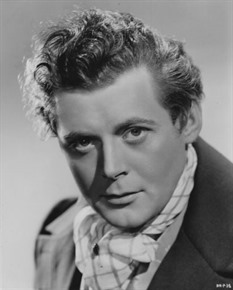
John Emrys Whittaker Jones was an English actor of Welsh heritage.

John Peter Wearing is an Anglo-American theatre historian and professor, who has written numerous books and articles about nineteenth and twentieth-century drama and theatre, including The Shakespeare Diaries: A Fictional Autobiography, published in 2007. He has also written and edited well-received books on George Bernard Shaw, Arthur Wing Pinero, extensive reference series on the London theatre from 1890 to 1980, and theatrical biographies, among other subjects. As a professor of English literature, Wearing has specialised in Shakespeare and modern drama.
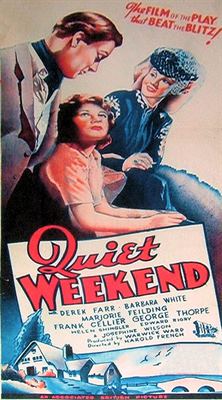
Quiet Weekend is a 1946 British comedy film directed by Harold French and starring Derek Farr, Frank Cellier, Marjorie Fielding, George Thorpe and Barbara White. A family try to relax during a weekend holiday in the country. It was a sequel to the 1941 film Quiet Wedding, with several of the actors reprising their roles. It was based on the long running 1941 West End play Quiet Weekend and shot at Welwyn Studios, Welwyn Garden City and Berkshire.

Betty Violet Marie Baskcomb was a British actress who appeared in roles for theatre, film, television and radio productions. She was born in London in 1914 and made her stage debut as a stooge opposite her father, the comedian A.W. Baskcomb, in 1931. Her screen debut was in the Hitchcock film The Man Who Knew Too Much (1934). Hitchcock insisted she played a part in the remake, and she was flown over to Hollywood for the role, although she was uncredited in both versions. On the radio, she was a member of the BBC Drama Repertory Company from the 1940s through to the 1970s. In 1956 she appeared on stage in Ring For Catty at the Lyric Theatre in London.
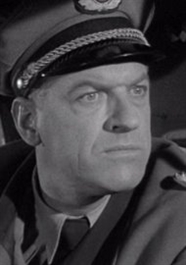
Tom Gill was a British actor who was born in Newcastle upon Tyne, Northumberland, England. He made his stage debut in 1935, and his theatre work included the original production of Noël Coward's After the Ball at the Globe Theatre in 1954. In 1951 he appeared at the Duchess Theatre in London's West End in the comedy play The Happy Family by Michael Clayton Hutton and reprised his role in the subsequent film adaptation.

Arthur Young was an English actor, notable for roles including Gladstone in the 1951 The Lady with a Lamp. He can be seen as a window cleaner in the film Radio Parade of 1935. He regularly appeared in BBC radio plays and was a member of the Corporation’s Drama Repertory Company in the late 1950s. His stage work encompassed West End revue, as well as Stratford.
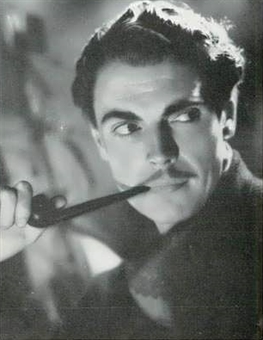
Walter Ivan Sackville Craig was a British actor, of Scottish descent, the son of Dr. Eric S. Craig and Dorothy Gertrude Craig.

Stephen Ewart was a British actor who was also credited as Stephen T. Ewart. His stage work included playing Tristan l'Hermite in the original London production of The Vagabond King at the Winter Garden Theatre, in 1927.
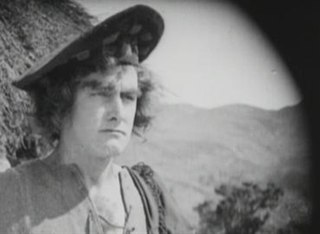
David Hawthorne was a British stage and film actor. He played the leading man in a number of films during the silent era, but later switched to character roles. One of his more notable roles was that of Rob Roy MacGregor in the 1922 film Rob Roy.
Daisy Fisher, born Daisy Gertrude Fisher; was an English novelist and playwright. She was the writer of several romantic novels, a lyricist, scriptwriter, actress and singer. In the 1920s she wrote the lyrics for some of Eric Coates' compositions. In 1926 she published her first book Lavender Ladies A Comedy in Three Acts followed by more in the 1930s. Fisher authored some plays with the song writer Harold Simpson, Ronald Jeans and Clifford Seyler. She was the wife of Herbert Mason the film director and producer who previously acted on stage. After the Second World War they worked together on some plays.

William Arthur Schröpfer known by the pen name and stage name Arthur Macrae was an English playwright and comic actor. He graduated from RADA in 1928; with acting work including the original West End productions of Noël Coward's Cavalcade (1931), and South Sea Bubble (1956). He wrote the book for the 1945 hit West End musical Under the Counter.
Madame Louise is a 1945 comedy play by the British writer Vernon Sylvaine.
Cry Liberty is a play by the British writer Esther McCracken. After a premiere at the Theatre Royal, Newcastle, the work's West End at the Vaudeville Theatre lasted for 26 performances from 21 April to 13 May 1950. It was considerably less successful than McCracken's pre-war and wartime hits such as Quiet Wedding and No Medals. The original cast included Irene Handl, Joyce Barbour, Edwin Styles and Anthony Sharp.

Wolf's Clothing is a comedy play by the British writer Kenneth Horne.
The Midshipmaid is a 1931 British comedy play by Ian Hay and Stephen King-Hall, which ran for 227 performances at the Shaftesbury Theatre in London's West End. The following year Hay wrote a novel based on the play.

Margaret Halstan was a British stage, radio, television and film actress. In theatre and film roles she often played upper-class ladies of the gentry, with a career spanning over six decades. She was particularly known for her Shakespearian roles, having debuted in 1895. At the turn of the century she joined Sir Frank Benson's theatre company, and also played in the theatrical companies of Sir George Alexander and Sir Herbert Beerbohm Tree, before making her debut in silent films in 1916.
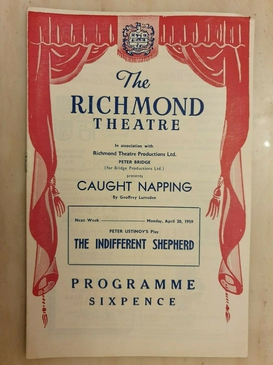
Caught Napping is a 1959 comedy play by the British writer Geoffrey Lumsden.

The Manor of Northstead is a 1954 comedy play by the British writer William Douglas Home. It is a sequel to his 1947 hit The Chiltern Hundreds. The title refers to the Manor of Northstead.

Silver Wedding is a 1957 comedy play by the British author Michael Clayton Hutton. First performed four years after the author's death, it premiered at the Opera House, Manchester before transferring to London's West End where it ran for 158 performances between 9 July and 23 November 1957 initially at the Cambridge Theatre before transferring to the Winter Garden Theatre. The West End cast included Evelyn Laye, Frank Lawton, Marie Lohr, Miranda Connell and Catherine Boyle.
















